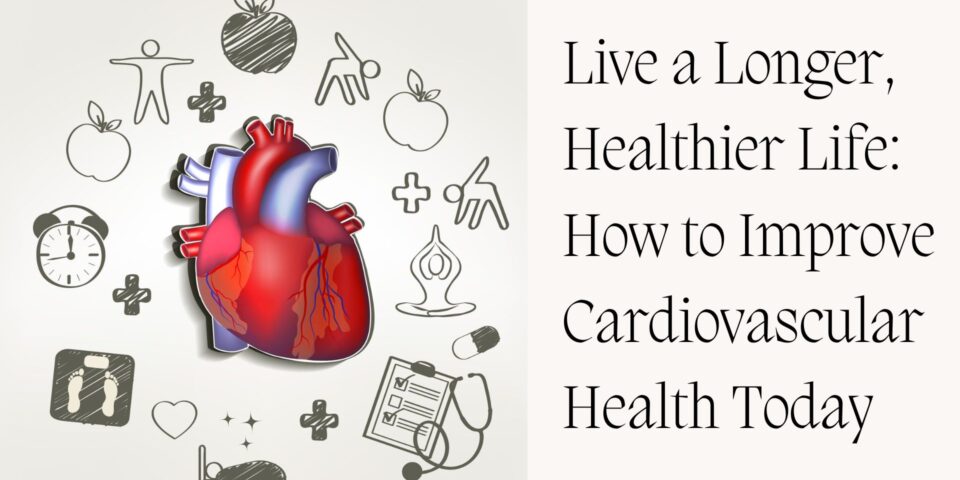Cardiovascular health is not merely about having a strong heart; it encompasses the entire circulatory system’s well-being. Let’s embark on a journey to uncover the intricacies of improving cardiovascular health and embracing a heart-healthy lifestyle.
Understanding Cardiovascular Health
What is Cardiovascular Health?
Cardiovascular health refers to the optimal functioning of the heart and blood vessels, ensuring efficient circulation throughout the body. It encompasses various factors, including blood pressure, cholesterol levels, and heart function.
Why is Cardiovascular Health Important?
A healthy cardiovascular system is vital for sustaining life. It supplies oxygen and nutrients to tissues while removing waste products. Moreover, optimal cardiovascular health reduces the risk of cardiovascular diseases, leading causes of mortality worldwide.
Common Cardiovascular Diseases
What is cardiovascular disease?
Cardiovascular disease (CVD) is an umbrella term encompassing a group of conditions affecting your heart and blood vessels. Think of it as the circulatory system’s health, impacting how blood pumps throughout your body. While various forms exist, many share common ground, making it crucial to understand this leading cause of global mortality.
Can heart problems cause erectile dysfunction?
Yes, heart problems can be a contributing factor to erectile dysfunction (ED). This is because healthy blood flow is essential for achieving and maintaining an erection. When heart problems impede blood flow, it can lead to ED. In some cases, ED can even be an early warning sign of underlying heart issues.
Vidalista 20mg amazon and Cenforce D Tablets are the medication that fixes erectile dysfunction in guys the chief successfully.
Coronary Artery Disease (CAD)
CAD occurs due to the buildup of plaque in the coronary arteries, restricting blood flow to the heart muscle, leading to chest pain (angina) or heart attack.
Heart Failure
Heart failure results from the heart’s inability to pump blood effectively, causing fatigue, shortness of breath, and fluid retention.
Stroke
When blood supply to the brain is disrupted, it results in a stroke, causing damage to the brain. Ischemic strokes are caused by blood clots, while hemorrhagic strokes result from blood vessel rupture.
Peripheral Artery Disease (PAD)
PAD involves narrowing of peripheral arteries, usually in the legs, reducing blood flow and causing pain, numbness, or tissue damage.
Lifestyle Changes for Cardiovascular Health
Implementing heart healthy lifestyle changes can significantly reduce your risk of cardiovascular disease.
Dietary Modifications
Following a diet that promotes heart health can have a substantial effect on cardiovascular well-being. A heart healthy diet is an eating plan that emphasizes foods that are good for your heart health and reduce the risk of heart disease.
- The Mediterranean Diet: Rich in fruits, vegetables, whole grains, and healthy fats, it reduces the risk of heart disease.
- Reducing Sodium Intake: Excessive sodium consumption can elevate blood pressure. Limiting processed foods and seasoning with herbs can help.
- Increasing Fiber Consumption: Fiber-rich foods such as fruits, vegetables, and whole grains aid in cholesterol management and promote satiety.
- Limiting Saturated and Trans Fats: Replace saturated fats with unsaturated fats found in nuts, seeds, and oily fish.
Physical Activity
Engaging in regular exercise helps to strengthen the heart and enhance circulation. What exercise is good for cardiovascular? Engaging in a variety of exercises for heart health, like brisk walking or swimming, can significantly improve your cardiovascular well-being.
- Benefits of Regular Exercise: Enhances cardiovascular fitness, lowers blood pressure, and promotes weight management.
- Types of Exercises for Cardiovascular Health: Incorporate aerobic exercises like walking, cycling, and swimming, along with strength training, flexibility, and balance exercises.
Smoking Cessation
How does smoking affect the cardiovascular system? Smoking unleashes a multi-pronged attack on your cardiovascular system, weaving a web of damage that increases the risk of heart disease, stroke, and other complications. Quitting smoking is one of the most significant steps toward improving cardiovascular health.
- Effects of Smoking on Cardiovascular Health: Smoking damages blood vessels, increases heart rate, and elevates blood pressure.
- Strategies for Quitting Smoking: Explore nicotine replacement therapy, behavioral counseling, and prescription medications to overcome nicotine addiction.
Managing Stress
Chronic stress negatively impacts cardiovascular health, increasing the risk of heart disease. How can stress increase the risk for cardiovascular disease?
- The Connection Between Stress and Cardiovascular Health: Stress triggers the release of hormones that raise blood pressure and cholesterol levels.
- Techniques for Stress Reduction: Practice mindfulness meditation, yoga, deep breathing exercises, or engage in hobbies to alleviate stress.
Importance of Regular Check-ups and Monitoring
Routine Medical Examinations
Regular health screenings help detect cardiovascular risk factors early.
- Blood Pressure Monitoring: High blood pressure often goes unnoticed but is a significant risk factor for heart disease.
- Cholesterol Levels: High cholesterol contributes to plaque buildup in arteries, increasing the risk of heart attacks and strokes.
- Blood Glucose Levels: Elevated blood sugar levels can damage blood vessels and increase the risk of diabetes and heart disease.
- Body Mass Index (BMI) Assessment: BMI helps assess weight-related health risks and guides weight management strategies.
Early Detection of Risk Factors
Identifying and addressing cardiovascular risk factors is crucial for preventive care.
- Understanding Risk Factors for Cardiovascular Diseases: Hypertension, high cholesterol, diabetes, obesity, and family history are common risk factors.
- Medical Consultation and Treatment: Consult healthcare professionals for personalized risk assessment and treatment options, including lifestyle modifications and medications.
Tips for Maintaining Cardiovascular Health
Stay Hydrated
Adequate hydration supports cardiovascular function and overall health.
- Benefits of Adequate Hydration: Maintains blood volume, regulates body temperature, and supports nutrient transport.
- Water Intake Recommendations: Aim for at least eight glasses of water per day, adjusting for activity level and climate.
Adequate Sleep
Quality sleep is essential for cardiovascular health and overall well-being. Can lack of sleep cause heart problems? Yes, insufficient sleep can raise your risk of heart problems. This is linked to factors like increased blood pressure, inflammation, and unhealthy choices. Aim for regular sleep to support your heart health.
- The Link Between Sleep and Cardiovascular Health: Sleep regulates hormones, reduces inflammation, and promotes heart health.
- Recommended Sleep Duration: Adults should aim for 7-9 hours of sleep per night for optimal health benefits.
- Tips for Better Sleep: Establish a consistent sleep schedule, create a relaxing bedtime routine, and optimize sleep environment for comfort.
Social Connections
Strong social support networks contribute to better cardiovascular outcomes.
- The Importance of Social Support: Social connections reduce stress, promote healthy behaviors, and provide emotional support during challenging times.
- Building and Maintaining Relationships: Foster relationships with friends, family, and community members through regular communication and social activities.
Limit Alcohol Consumption
Moderate alcohol consumption may have cardiovascular benefits, but excessive intake poses risks.
- The effects of Alcohol on the Heart: Heavy drinking can raise blood pressure, contribute to weight gain, and increase the risk of heart disease and stroke.
- Recommended Limits for Alcohol Intake: Men should limit alcohol to two drinks per day, while women should consume no more than one drink per day for heart health.
Integrating Technology for Cardiovascular Health
Wearable Fitness Trackers
Wearable devices offer insights into physical activity levels and heart rate variability.
- Monitoring Physical Activity and Heart Rate: Track steps, distance, and active minutes to stay motivated and accountable.
- Setting Goals and Tracking Progress: Set achievable fitness goals and monitor progress over time for continuous improvement.
Mobile Applications
Health and wellness apps provide tools for managing diet, exercise, and stress.
- Tracking Diet and Nutrition: Log food intake, monitor calorie consumption, and receive nutritional recommendations for heart-healthy eating.
- Meditation and Stress Management Apps: Practice guided meditation, deep breathing exercises, and relaxation techniques to reduce stress and promote mental well-being.
Telemedicine and Remote Monitoring
Telehealth services facilitate remote consultations and monitoring for cardiovascular patients.
- Consultations with Healthcare Providers: Access virtual appointments with cardiologists and primary care physicians for routine check-ups and follow-up care.
- Remote Monitoring of Vital Signs: Use wearable devices and connected health platforms to track blood pressure, heart rate, and other vital signs from home.
Understanding the Role of Genetics in Cardiovascular Health
Genetic Predisposition to Cardiovascular Diseases
Family history plays a significant role in cardiovascular risk assessment.
- Family History and Risk Assessment: Individuals with a family history of heart disease may have an increased risk and should undergo regular screening.
- Genetic Testing for Cardiovascular Conditions: Genetic testing can identify inherited conditions and guide personalized treatment and preventive strategies.
Epigenetics and Lifestyle
Epigenetic factors interact with lifestyle choices to influence cardiovascular health.
- How Lifestyle Choices Influence Genetic Expression: Diet, exercise, stress management, and environmental factors can impact gene expression and disease risk.
- Epigenetic Modifications for Cardiovascular Health: Adopting healthy behaviors can positively influence epigenetic markers and reduce cardiovascular risk.
Promoting Cardiovascular Health in Different Life Stages
Childhood and Adolescence
Early intervention and education are key to promoting heart health from a young age.
- Importance of Establishing Healthy Habits Early: Encourage regular physical activity, nutritious eating, and avoidance of tobacco products during childhood and adolescence.
- Encouraging Physical Activity and Healthy Eating: Make physical activity fun and involve children in meal planning and preparation to instill lifelong healthy habits.
Adulthood
Balancing work, family, and health is essential for maintaining cardiovascular wellness.
- Screening for Cardiovascular Risk Factors: Adults should undergo regular health screenings and consult healthcare providers for personalized risk assessment.
- Balancing Work, Family, and Health: Prioritize self-care, time management, and stress reduction techniques to maintain optimal cardiovascular health in adulthood.
Older Adults
Healthy aging involves proactive management of cardiovascular risk factors and lifestyle adjustments.
- Managing Chronic Conditions: Older adults should adhere to medication regimens, attend regular medical appointments, and monitor vital signs to manage chronic conditions effectively.
- Adapting Exercise Routines: Modify exercise intensity and duration to accommodate age-related changes in physical fitness and mobility.
- Nutritional Considerations: Focus on nutrient-dense foods, hydration, and portion control to support overall health and vitality in older age.
Improving cardiovascular health requires a holistic approach encompassing lifestyle modifications, regular monitoring, and leveraging technology for personalized care. By understanding the importance of cardiovascular health and implementing proactive strategies, individuals can enhance their quality of life and reduce the risk of cardiovascular diseases.
FAQs
1. How to improve cardiac health?
To strengthen your heart, focus on these key lifestyle changes: Move often: Aim for 150 minutes of moderate-intensity exercise weekly (brisk walking, swimming). Eat smart: Choose fruits, veggies, whole grains, lean protein, and healthy fats. Manage weight: Stay within a healthy weight range for your height. These simple steps can significantly improve your heart health.
2. Can stress really affect my heart health?
Yes, chronic stress can negatively impact cardiovascular health by raising blood pressure, increasing heart rate, and promoting inflammation. It is essential to incorporate stress management techniques into your daily routine to support heart health.
3. How long does it take to improve cardio?
You can see early signs of improved cardio within weeks, with consistent effort. Aim for at least 150 minutes of moderate-intensity cardio (or 75 minutes vigorous) spread across 3-5 days per week. Remember, progress is individual, and consulting a healthcare professional is always recommended.
4. How to make a weak heart stronger?
The American Heart Association recommends at least 150 minutes of moderate-intensity aerobic exercise or 75 minutes of vigorous-intensity aerobic exercise per week for cardiovascular health. Additionally, incorporating strength training exercises two days per week is beneficial for overall fitness.
5. Can genetics determine my risk of cardiovascular disease?
While genetics can influence cardiovascular risk, lifestyle factors such as diet, physical activity, and smoking habits also play significant roles. Understanding your family history and undergoing genetic testing can provide valuable insights into your risk profile, allowing for proactive preventive measures.



